
A reader's SFG experience
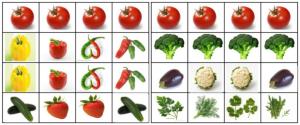



The growing season is here! And this means its time to get those seedlings planted outside, but before you do that, make sure you harden them off.. Your seedlings have been pampered indoors for weeks. They need to be introduced slowly to the elements of wind and intense sun.
Initially, you will put plants outdoors only for short periods of time, perhaps for a couple of hours. You'll want to set them in a semi-shaded area. Gradually, you will increase the time plants are kept outdoors; you also will gradually increase their exposure to sun. after about a week, these plants will be ready for the outdoor life 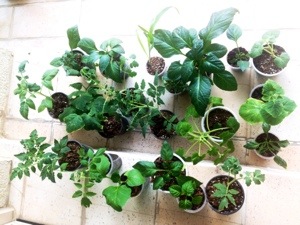
As part of acclimating the plants to the outdoors, you also will cut back on watering. This will allow plants to toughen and will prepare them for being transplanted. If you still havent prepared your soil, now is the best time; work some compost and mineral rock dust in your soil, turning it and preparing it for those hungry seedlings.
Alzainah Albabtain, a 22 year old student, is growing her own food in the scorching heat of Kuwait and wants others to give it go too
A green fingered student from Kuwait is taking the blogosphere by storm with her ‘It All Grows’ blog. Filled to the rafters with gorgeous photos of lovely fruit and veg, recipes, and gardening tips, Alzainah wants to prove that “good fruits and vegetables don’t have to travel across the world to make it to your plate.” I caught up with her to find out how she got hooked on gardening and her insider tips for growers in the Middle East.
What inspired you to get your garden started?
I’ve always been fascinated by nature and wildlife, but never by gardening and how food is produced because, just like most people in Kuwait, the idea of growing food was quite foreign. I used to think that it took large expensive greenhouses a hundred kilometres away in Wafra with countless staff and complicated fertilizers to produce vegetables in Kuwait, until one of my relatives mentioned her 10 year old grandson’s cherry tomatoes, I was baffled! He grew cherry tomatoes in a container – I followed with questions like “outdoors? In our weather?” “Is it possible?”
I was completely shocked, and thought to myself, if a 10 year old can do it, I can at least try. The next day I went and bought seeds of whatever I found. I planted them in my back yard, under some palm trees, and with skepticism, I checked on them every other day. Once the seeds sprouted I started taking beautiful Micro photos, to show to my family. In a short time with a lot of research, I managed to turn my entire indoor pool into a greenhouse of cherry tomatoes. After this gratifying experience, I was hooked, I found myself extremely passionate about gardening in Kuwait.
What have been the biggest barriers you have faced in getting your garden to bloom?
First, it was figuring out what grows when. All the research I was doing left me hungry to learn more, but I was having trouble relating general gardening principles to our desert conditions. Plant care is so different, and the seasons are the complete opposite. It took me a while to figure out the seasons here, its like this; a short warm season, a long cool season, then short warm again, and then summer during which gardeners take a break.
Another issue was organic pest control. There is so little offered in Kuwait when it comes to organic products, so it took me a while to find what I use now, which is organic insecticidal soap. I would go to plant nurseries and for any problem there was always a chemical solution, whether for fertilizing or pest control and I refused to use any of their recommendations on my plants. To me, it just didn’t make sense to spray something which you need to wear a gas mask to handle, on the plants I wanted to eat.
You’ve been gardening for over a year now. What tips would you give people want to grow their own food in the scorching heat of the Middle East?
It’s the blog I’ve started last year, I’ve actually been gardening for much longer. The tips would be, to start with something easy, to do your basic research on what plant you’re growing, and to make your own compost, because its the best fertilizer there is. You cant go wrong by starting with basil and arugula, grow them in simple potting mix in a sunny spot, any time from October to January or from February to May as they don’t like it too cold. Both plants are fast growing, easy, and delicious.
You’re right that you can’t grow in the scorching heat but you also can’t grow in the frost which other climates have to deal with. In our case we have three really hot months, (even if things did grow, I wouldn’t want to stand over or take care of them in the heat) but people look past the 9 months of good weather! And you also cant grow anything in the sand, who says you have to? Good soil is so easy to find and make, so we really have no excuse to why we think it’s so crazy to grow fresh food.
Why do you think it’s important to encourage your readers to use organic products?
It’s organic practices that make your greens superior to those at the supermarket. The joy of picking something and eating it right away without worrying about insecticides or preservative sprays is unbelievable. A big part of organic gardening is using compost, and making your own is the best thing to do, homemade compost recycles garden and kitchen scraps into beautiful dark fertilizer, which keeps plants happy all season long.
Water shortages are a real issue in the region – what tips do you have to grow with limited water?
Growing in raised beds like I do, gives you complete control over your soil, and compost rich soil with peat moss, helps retain water, and minimizes water loss. Drip irrigation is a way to control water use and deliver water directly to the plant. Another good way to prevent loss of moisture is using mulch to cover the soil surface.
Favourite crop and your favourite recipe?
My favorite crop to grow in Kuwait is Bright Lights Rainbow Swiss Chard, because its absolutely gorgeous, with bright magenta and yellow ribs and large dark shiny leaves, its highly nutritious and does amazingly well from October to June. Thats a very long time if you ask me. I like to sauté it as a side dish with some almonds and garlic oil.
What would you tell someone thinking of starting a garden but is little worried about lack of costs/time/expertise?
I would recommend starting small, with a potted plant, and see how it goes from there. Start with something easy, like herbs and leafy greens. Most importantly, the internet is your best friend when it comes to gardening, I’ve learned everything I know from online research and youtube tutorials. In fact, I created my blog to help others, to share my successes and challenges and prove how beautiful our gardens can grow.
Ive recently started composting in chicken wire bins which I easily made. The wire is sold in rolls and is very easy to work with. 
This method has proven more successful in my case, than the plastic bins. As the compost is by far hotter than before. I've never had actual steam blowing in my face when digging into my compost before. 
I made sure the bin is in the shade, as to not lose moisture so quickly. 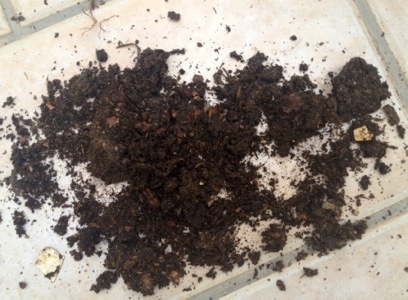
This method is cheaper to set up, and in my case cooking compost better. I can't wait to fill the entire thing, and have my future plants happy and well fed.
I've been juicing fruits and vegetables everyday and since then, I've been tossing all of the left over juice pulp in y compost This is probably giving my compost too much nitrogen all at once, so it started getting soggy and matted, and once that happens in your compost for whatever reason, it will start to stink a little. It's because anaerobic bacteria; the bad guys will decompose matter where there is no oxygen and high moisture. They give off a bad smell and slimy green stuff. 

To get the good guys back in, you should introduce oxygen back to the mix. This could easily be done by either laying out the compost for a while, and mixing it back together. Compost does happen fast in Kuwait, so do take advantage of the hot summer.
Uh oh! I've got aphids!  [/caption] Aphids feed on most fruit and vegetable plants, they reproduce like there's no tomorrow. Both adults and nymphs suck plant sap, which usually causes distorted leaves, buds, branch tips, and flowers. Severely infested leaves and flowers may drop. As they feed, aphids excrete a sweet, sticky honeydew onto the leaves below. Also, some aphids spread viruses as they feed. Aphids are bad news, and if you find just one in your garden, you should act right away. Look under the leaves to find them.
[/caption] Aphids feed on most fruit and vegetable plants, they reproduce like there's no tomorrow. Both adults and nymphs suck plant sap, which usually causes distorted leaves, buds, branch tips, and flowers. Severely infested leaves and flowers may drop. As they feed, aphids excrete a sweet, sticky honeydew onto the leaves below. Also, some aphids spread viruses as they feed. Aphids are bad news, and if you find just one in your garden, you should act right away. Look under the leaves to find them.
Im using organic insecticidal soap (orange bottle). I have the blue bottle incase of extreme infestations that can lead me to pull out the plants like I did with my zucchinis. Organic damage control
 This control method only gets rid of the adults, the sticky tape can be found in ACE Hardware, to get the larvae, you can place pieces of raw potato on the soil surface and check it after around 5 hours, you should find the larvae of these flies eating the potato away, discard the potato piece and keep doing it and numbers should decrease. Fruitflies
This control method only gets rid of the adults, the sticky tape can be found in ACE Hardware, to get the larvae, you can place pieces of raw potato on the soil surface and check it after around 5 hours, you should find the larvae of these flies eating the potato away, discard the potato piece and keep doing it and numbers should decrease. Fruitflies  A major problem I've been having is that fruit flies have been laying eggs in my butternut squash, I've lost six fruit already, one day the fruit is nice and healthy, and the next I find a mushy dimple, and when I crack it open, I find larvae (white worms) feeding away inside. It's very hard to hand pollinate the flower then cover, I need to figure out a new organic way to protect my fruit, since the plant is growing too fast and over my very tall trellis.
A major problem I've been having is that fruit flies have been laying eggs in my butternut squash, I've lost six fruit already, one day the fruit is nice and healthy, and the next I find a mushy dimple, and when I crack it open, I find larvae (white worms) feeding away inside. It's very hard to hand pollinate the flower then cover, I need to figure out a new organic way to protect my fruit, since the plant is growing too fast and over my very tall trellis. Im worried this might happen to my zucchini fruits once they start forming, if I cover the plants, bees won't have access to pollinate the flowers. Whiteflies
Im worried this might happen to my zucchini fruits once they start forming, if I cover the plants, bees won't have access to pollinate the flowers. Whiteflies  These are the worst pests in the garden, they like a lot of plants including tomatoes and squash plants, if they're found on the underside of leaves, you must control them immediately as they cause serious damage. Whiteflies and they're nymphs (the young whiteflies) suck on the sap of the leaves, causing the spread of viruses, yellowing leaves, and stunted growth, they spread very fast so one must control them quickly. The yellow sticky tape works for adults, so does insecticidal soap, and horticultural oil.
These are the worst pests in the garden, they like a lot of plants including tomatoes and squash plants, if they're found on the underside of leaves, you must control them immediately as they cause serious damage. Whiteflies and they're nymphs (the young whiteflies) suck on the sap of the leaves, causing the spread of viruses, yellowing leaves, and stunted growth, they spread very fast so one must control them quickly. The yellow sticky tape works for adults, so does insecticidal soap, and horticultural oil.  I am also following a control method which is to place reflective mulch, in my case aluminum foil under the possible host plants. The foil disorients the flies and annoys/repels them. Leaf Miners
I am also following a control method which is to place reflective mulch, in my case aluminum foil under the possible host plants. The foil disorients the flies and annoys/repels them. Leaf Miners  I think most gardens in Kuwait have this problem around this time, leaf miners are a certain kind of fly that lays eggs inside the leaves, later having the larvae grow and feed inside the leaf creating squiggly lines in their trail. Its not a major problem if its a big strong plant, the correct control measure is to pick and discard the affected leaves, but I'm not about to sacrifice almost a foot-wide leaf for a few blemishes, I found a simpler way which is to squish the visible worm with the my fingers, it will die inside the leaf and will not make it as an adult, in return I will keep the leaf and it will recover quickly.
I think most gardens in Kuwait have this problem around this time, leaf miners are a certain kind of fly that lays eggs inside the leaves, later having the larvae grow and feed inside the leaf creating squiggly lines in their trail. Its not a major problem if its a big strong plant, the correct control measure is to pick and discard the affected leaves, but I'm not about to sacrifice almost a foot-wide leaf for a few blemishes, I found a simpler way which is to squish the visible worm with the my fingers, it will die inside the leaf and will not make it as an adult, in return I will keep the leaf and it will recover quickly.
 The reason my grass clippings are N+C is because I leave them in the sun for about 2 weeks before I put them in the bin, this way the dried brown grass reacts with the still fresh grass to make fast compost.
The reason my grass clippings are N+C is because I leave them in the sun for about 2 weeks before I put them in the bin, this way the dried brown grass reacts with the still fresh grass to make fast compost.  [/caption]
[/caption]  You can see that the wood shavings take longer to compost than the grass and kitchen scraps.
You can see that the wood shavings take longer to compost than the grass and kitchen scraps. Im also making new compost tea to water and spray the plants with.
Im also making new compost tea to water and spray the plants with.
Compost in any form is a plant's idea of gourmet health food. Made into tea, it's the ideal liquid fertilizer, especially for young plants. Compost tea helps plants grow stronger and more productive and, evidence suggests, can protect against disease. The tea can be sprayed on the plants or used instead of water for a soil drench. I'm making compost tea the inexpensive and simple way, make sure you're using non-chlorinated water.
1- Empty about a cup and a half of mature compost into an old sock.  2- tie the sock.
2- tie the sock.  3- toss it in a bucket of water, here I am recycling an Rawdatain plastic water gallon.
3- toss it in a bucket of water, here I am recycling an Rawdatain plastic water gallon.  4- stir the mixture 5- keep stirring it as often as you can for a couple of days, stirring allows oxygen to enter the mixture in order for aerobic bacteria to do their job. Update: Here is the compost tea two days later:
4- stir the mixture 5- keep stirring it as often as you can for a couple of days, stirring allows oxygen to enter the mixture in order for aerobic bacteria to do their job. Update: Here is the compost tea two days later: 
It smells a little sweet and earthy, no bad smell at all!
 [/caption] Even after the temperatures drop, conditions outside in the garden are still much harsher than your home grown vegetable seedlings are accustomed to. If you were to take those sensitive plants and move them directly into the garden there’s a good chance that they would not survive the transition. What the vegetable plants need is a hardening off period where they can slowly adapt to the more intense light, winds, temperature variations, and other conditions that they will encounter in the outdoor world. Hardening off requires time but the process itself is a simple one. Begin by carefully transporting your seedlings to a somewhat sheltered location where they can get their first taste of what life outdoors is going to be like. This initial exposure should be brief, only an hour or two during the early morning or late evening hours.
[/caption] Even after the temperatures drop, conditions outside in the garden are still much harsher than your home grown vegetable seedlings are accustomed to. If you were to take those sensitive plants and move them directly into the garden there’s a good chance that they would not survive the transition. What the vegetable plants need is a hardening off period where they can slowly adapt to the more intense light, winds, temperature variations, and other conditions that they will encounter in the outdoor world. Hardening off requires time but the process itself is a simple one. Begin by carefully transporting your seedlings to a somewhat sheltered location where they can get their first taste of what life outdoors is going to be like. This initial exposure should be brief, only an hour or two during the early morning or late evening hours. 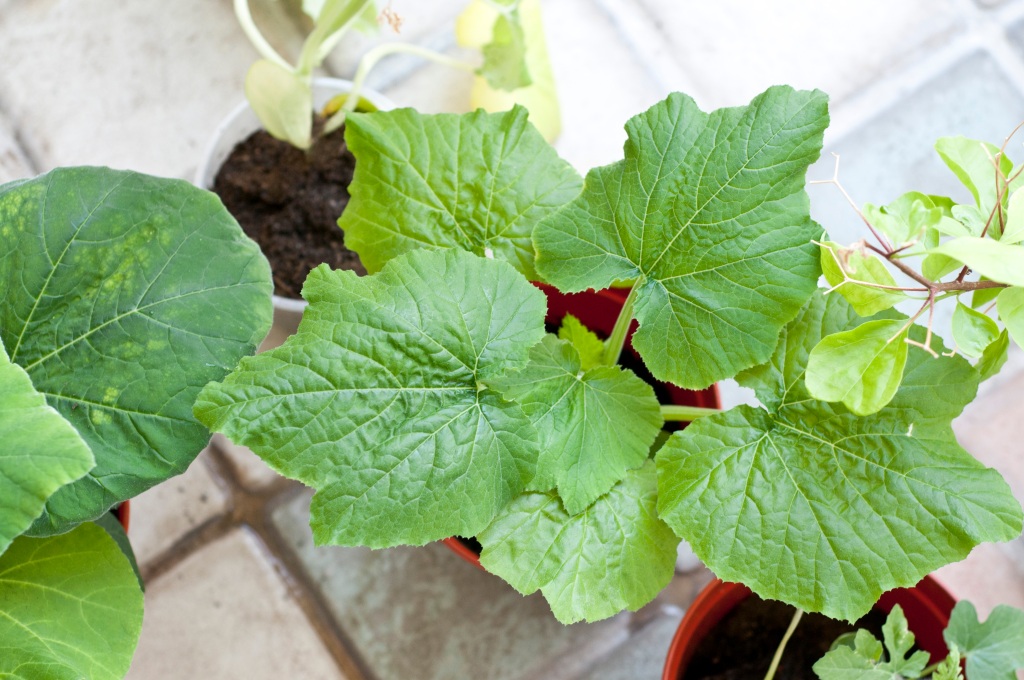 Start the hardening off process a couple of weeks before you anticipate planting the seedlings out into the garden. Each day you will be moving the plants outside for increasing lengths of time, allowing them to gradually get used to the sunshine, wind, rain, and other outdoor conditions. In my case I've moved them to a warm area with direct sun through glass windows. The area is not as hot as it is outside, so I can leave them all day. The Terra-cotta pots are from TrueValue.
Start the hardening off process a couple of weeks before you anticipate planting the seedlings out into the garden. Each day you will be moving the plants outside for increasing lengths of time, allowing them to gradually get used to the sunshine, wind, rain, and other outdoor conditions. In my case I've moved them to a warm area with direct sun through glass windows. The area is not as hot as it is outside, so I can leave them all day. The Terra-cotta pots are from TrueValue. 
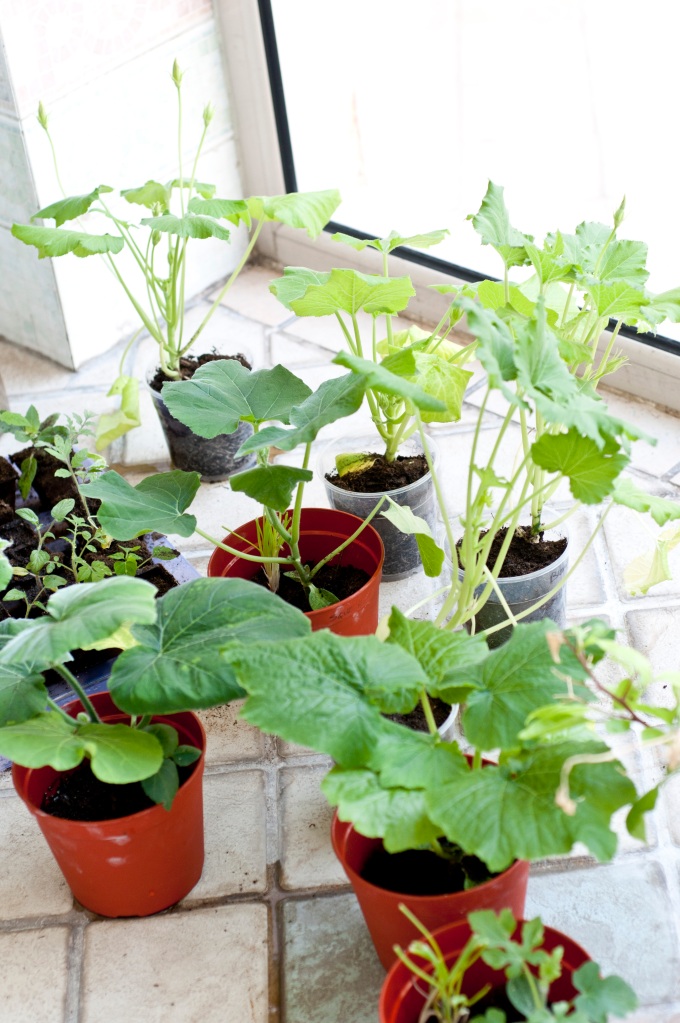 Don't skip this crucial step when transferring your seedlings to their containers or in the ground.
Don't skip this crucial step when transferring your seedlings to their containers or in the ground.
 This compost took under 3 months to transform from grass clippings, orange peels, cardboard, melon rinds, and more, to this rich dark magic fertilizer and mulch.
This compost took under 3 months to transform from grass clippings, orange peels, cardboard, melon rinds, and more, to this rich dark magic fertilizer and mulch.  Sifting compost is done by pushing the compost through the holes or by shaking the sifter repeatedly. Make sure the container under the sifter is larger in size; to collect everything, because your compost is very valuable . I used a plastic basin.
Sifting compost is done by pushing the compost through the holes or by shaking the sifter repeatedly. Make sure the container under the sifter is larger in size; to collect everything, because your compost is very valuable . I used a plastic basin.  Collect and toss the unfinished compost (left in the sifter) in your compost bins for another round of composting. Can you believe this entire process took under three months!
Collect and toss the unfinished compost (left in the sifter) in your compost bins for another round of composting. Can you believe this entire process took under three months!
A lot of people really like the idea of gardening, but don't imagine themselves doing it since they don't have space. You don't need to be planting things in the ground, container gardening is perfectly fine! and maybe even better, since you completely control the soil. Containers come in all shapes and sizes and they will fit your lifestyle and space. If you live in an apartment, you may have a balcony that is perfect for container gardening, or a wide enough window sill outside your window to fit a container with all your favorite cooking herbs! space really isn't an issue. Anything will grow in compost rich soil in full sun, you just need to fit its roots in their correct size container! Tomatoes need a minimum size 5 gallon container, and herbs will fit really anywhere thats about 8 inches wide and deep. The Square Foot Gardening method I'm adopting for my garden is essentially a container method. So find a good spot around your house that receives about 8 hours of sunshine and you'll have a nice kitchen container garden to last you from September to May. 
Here's a photo update on my seedlings: 
 Here's something I found interesting, This is a French Marigold seedling escaping its very peculiar seed:
Here's something I found interesting, This is a French Marigold seedling escaping its very peculiar seed: 









